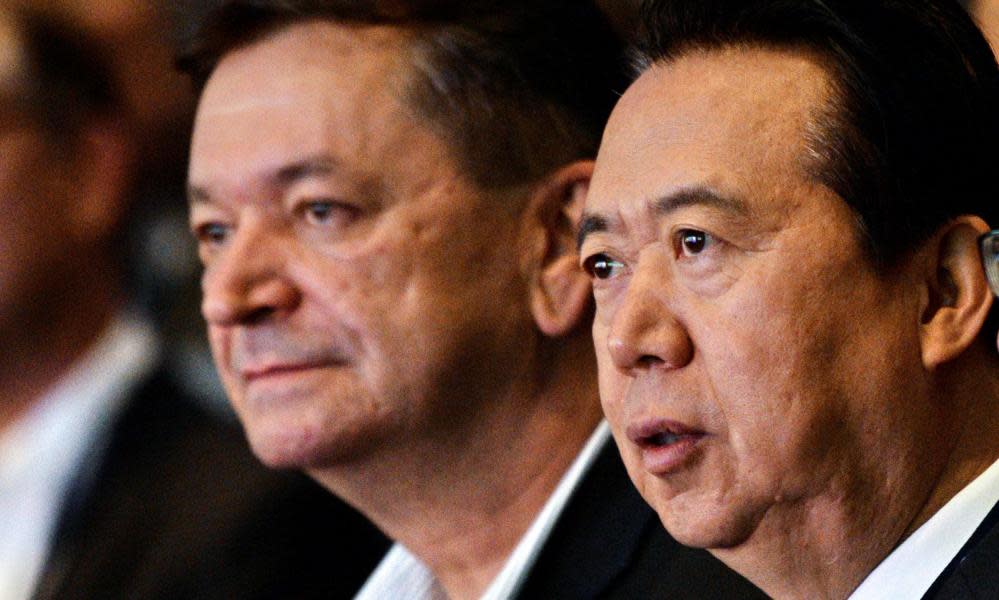Putin critics voice alarm at prospect of Russian Interpol chief

Western officials and Kremlin critics are watching with mounting alarm as Interpol prepares for a vote that could put a Russian interior ministry general in charge.
The general assembly of Interpol, which facilitates international police cooperation, is under way in Dubai and will vote on a new president on Wednesday. Alexander Prokopchuk, who was appointed to lead the Russian bureau of Interpol in 2011 and is currently a vice-president of the organisation, is considered to be the leading candidate. Critics say that he oversaw a policy of systematically targeting critics and dissidents during his time in charge of the Russian office of Interpol.
Bill Browder, a British-American financier who has campaigned for western countries to implement sanctions against Russian officials accused of human rights abuses, said on Tuesday that Prokopchuk had been in charge of Russia’s Interpol bureau at a time when Moscow repeatedly tried to have “red notice” arrest warrants issued for him through the organisation. The central Interpol body rescinded the warrants, believing them to be politically motivated.
“There is probably no more inappropriate person than this person and there’s no more inappropriate country to have any kind of leadership position at Interpol than Russia,” said Browder at a press conference in London.
Browder later tweeted a letter signed by 12 US senators including Senate minority leader Chuck Schumer and Dianne Feinstein that said: “Mr Prokopchuk has a history of serving in Russian President Vladimir Putin’s dubious security services and reportedly attempting to abuse Interpol to pursue Russia’s political enemies.”
Marina Litvinenko, the widow of poisoned dissident Alexander Litvinenko, told the BBC’s Newsnight programme on Tuesday night that having a Russian as president of Interpol would lead to abuse of the red notice system. “Everybody who is asking for political asylum here in the UK now will not feel safe at all,” she said.
Her concerns were echoed by Tory MP Bob Seely, an expert in Russian affairs, who told the programme: “Putting ... a general, a senior representative of one of the most criminalised governments on Earth in charge of Interpol makes a mockery of the organisation in principle.”
Interpol is looking for a new president after its previous chief, China’s Meng Hongwei, unexpectedly disappeared during a routine visit home in September. It later transpired he had been swept up in an investigation of corrupt officials. The two main candidates to replace him are Prokopchuk and South Korea’s Kim Jong Yang, but the Russian is widely tipped as favourite.
Russian opposition politicians and exiles have expressed fears that if a Russian is in charge of the whole organisation, there will be less of a filter to screen out inappropriate Kremlin requests. Alexei Navalny, an anti-corruption activist and opposition politician, wrote on Twitter that his team had “suffered from abuse of Interpol for political persecution by Russia”.
In London, the exiled former Russian oligarch Mikhail Khodorkovsky said: “I have serious concerns that if Prokopchuk is elected, he will be ready to carry out absolutely any actions on the orders of the Kremlin.”
Browder said: “If a Russian is in charge of Interpol, then the west will have to look for Plan B.” This would either involve setting careful restrictions on Interpol’s actions, he said, or setting up a new body only involving “countries who abide by the rule of law”.
The Trump administration threw its weight behind Kim on Tuesday. Speaking in Washington, the secretary of state, Mike Pompeo, said: “We encourage all nations and organisations that are part of Interpol and that respect the rule of law to choose a leader of credibility and integrity that reflects one of the world’s most critical law enforcement bodies. We believe Mr Kim will be just that.”
In a sign of the potential turmoil that could ensue, Lithuania’s parliament voted unanimously on Tuesday to consider leaving Interpol if Prokopchuk wins the vote.
The British human rights lawyer Ben Emmerson said there was “systematic evidence of abusive use of the Interpol process in order to pursue those who are perceived to represent a political threat” by Russia and several other authoritarian countries. Similar concerns were raised after the election of Meng, and China was also accused of abusing the Interpol system.
British officials have made it clear that they are backing Yang, and have expressed alarm at the prospect of Prokopchuk taking over.
“This is really quite an extraordinary situation, to find ourselves with the possibility of not just a fox in charge of the hen coop, but actually the assassin in charge of the murder investigation,” the Conservative MP and chair of the commons foreign affairs committee, Tom Tugendhat, said on Tuesday.
A day earlier, four US senators signed a letter opposing the election of Prokopchuk. Vladimir Putin’s press secretary, Dmitry Peskov, said the letter amounted to “interference in the electoral process of an international organisation”.

 Yahoo News
Yahoo News 
